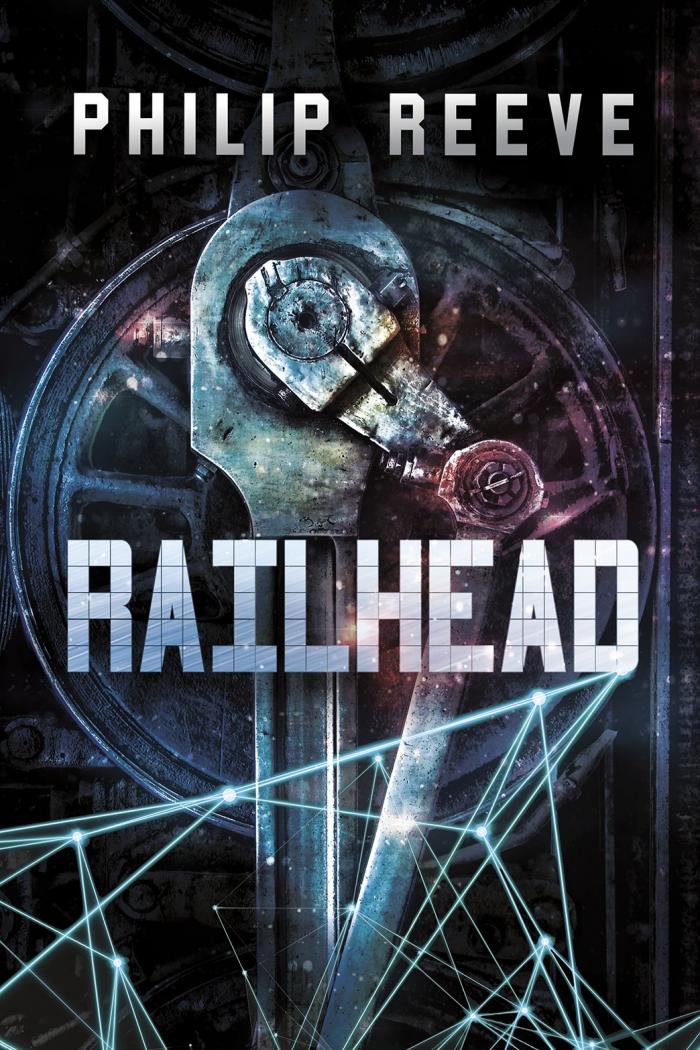Reeve’s RAILHEAD an Intergalactic Train Ride Across the Universe
FTC Statement: Reviewers are frequently provided by the publisher/production company with a copy of the material being reviewed.The opinions published are solely those of the respective reviewers and may not reflect the opinions of CriticalBlast.com or its management.
As an Amazon Associate, we earn from qualifying purchases. (This is a legal requirement, as apparently some sites advertise for Amazon for free. Yes, that's sarcasm.)

RAILHEAD by Philip Reeve is a sci-fi novel from Switch Press that takes place in the far future, across countless planets and star systems. And the fastest form of transportation? No, not by spaceship, but by train. Yes, train!
It seems that mankind has never lost its infatuation with travel by rail, and in this future so far removed from present day, planet Earth itself is basically forgotten, and only gone back to for a getaway.
The story centers around a young man named Zen Starling, a young run of the mill thief who was happy just stealing what he needed from the local bazaar and selling his stolen goods for money to help feed his paranoid Mother and sister. He loved trains (as did everyone). What he didn’t know was that his mother had good reason to be paranoid, and that someone else had plans for him--plans for him to steal something that could possibly change everything mankind had always thought about itself, plans that would propel him across the universe, involving him in the murder of the emperor, falling in love with the unlikeliest of beings, and having the entire military force after him--who, by the way also travelled by train.
Now I'm not a huge reader by nature, and when I do pick up a book, I like the story to involve something out of the ordinary--enough so that even if the story in and of itself is not so good, the premise would keep me interested enough to finish it.
What I found was that RAILHEAD was actually the best of both worlds for me: a very good story with a twist that I had not read before. Perhaps it was because I have always been somewhat of a railhead myself, that to read a futuristic novel where the major source of travel was by train and in fact the major source of political power was derived from a few select families that controlled the rail lines, just struck an instant chord with me.
What Reeve was able to do was not only keep but also convey that sense of magic and wonder that train travel has always held in our psyches, even into the far future. Granted the trains have evolved into much more than just engines mindlessly pulling cars; but despite the leap countless centuries in technology affords, that basic human need of wonderment is still apparent in everyone. It’s as if the place and time have changed but that is it. And that was the most compelling part of this book that had me not wanting to put it down.
Yes, the story was good and it gave me the sense that there would be many aspects that a sequel could be written about, just as someone would dream about taking a train ride to different parts of the country. And the similarity of how a few families that controlled the rails stretching across the universe via tracks and “K-Gates” thus making them wealthy, all the while controlling the political power, mirrored to me just how is was in the US in the 1800’s when the railroad barons of yesteryear made vast fortunes all on the backs of two steel rails stretching across and connecting the country.
The story itself is easy to follow, and very thought out and detailed. Reeve paints an intricate virtual landscape that makes it very easy to see in your mind’s eye. There are characters that you like, some that you will hate, and others that you will change your mind about as well. The mysterious Raven, the unique Nova, the very different Uncle Bugs, the military bloodhound Malik and the flighty and vindictive Threnody, to name but some of the characters you come across in this book
I did however find it difficult to read some of the names of the characters and places in the book; several I found unpronounceable.
Another thing that I find strangely -- and increasing more -- common in sci-fi books and movies these days is that they seem to go somewhat at length to set up their stories by trying early on to say to some extent that there is no God; man, it seems, will go to great lengths to create their own as is the case here with the great computer programs (“Guardians”) that run the “Network,” and data seas are said to have been created by man and over the centuries evolved into this great force that is worshiped in a god-like fashion, having taken on human form from time to time and have even been given names. It’s as if no one these days wants to accept the fact that the God who created the real universe could easily create their imaginary worlds in the pages of their books. I often wonder sadly why that is.
That aside, I can say that this is one of the most enjoyable sci-fi books I have read in a long time. It is imaginative, original, well thought out and full of detail. I liked the fact that the chapters are not very long, as it gave me stopping points so that I did not have to try and pick up again in mid-stream after I had put the book down for the day.
It is a fast paced story that builds momentum like a locomotive, and the ending is one that was just perfect for this story.
At 350 pages, including a glossary of terms and things that you’ll read about in the book -- a nice touch, although you’ll get most of it as you read, but some of the definitions do give you a little back story explaining exactly what the things in this world are.
If you like sci-fi and you like trains (even big futuristic ones) -- and who doesn’t? -- I think you’ll really enjoy this read.


